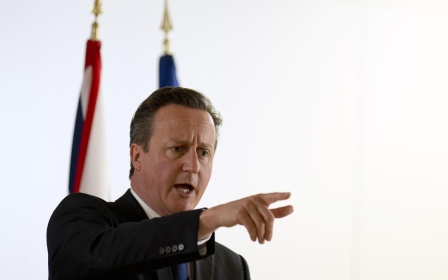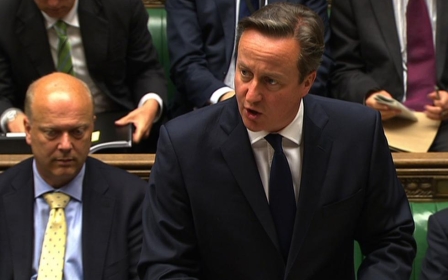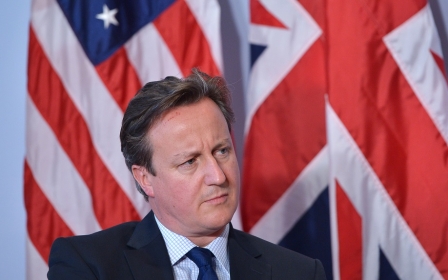Why Cameron got IS so wrong

It is a well-known fact that most British prime ministers take leave of their senses in the end. Margaret Thatcher, Tony Blair and Gordon Brown were all three at least partially round the bend by the time they lost office.
I remember the moment I realised that Tony Blair was losing grip on reality. It was during his Labour Party conference speech in 2001, just a few weeks after the destruction of the Twin Towers. As he spoke of creating a new world order out of the ruins of 9/11, it became clear that Mr Blair was out of his depth.
To date, David Cameron has on the whole been an unusually well balanced prime minister (greatly fortified by the fact that he has a sensible wife, Samantha.) He sees things in perspective, and has not been overwhelmed by high office.
Recently, however, there have been worrying signs. Just as Tony Blair lost all sense of perspective over al-Qaeda, so Cameron appears to have been driven off course by the rise of the Islamic State group (IS).
In some ways this is understandable. As prime minister it is natural and right to feel a sense of personal responsibility for the British deaths in last week’s beach atrocity. With that sense of responsibility comes the desire to act.
Nevertheless the prime minister’s reaction to the horror in Tunisia suggests that he may have reached some kind of personal turning point. In the long term this is very dangerous, not just for him but for everyone else.
First of all, let’s examine Cameron’s assertion that IS presents an "existential" threat to Britain. This is excitable nonsense. There is no chance whatsoever of the black IS flag flying over Downing Street, or the Queen being replaced by a caliph.
By contrast in 1940 there was a genuine possibility that the swastika could have flown over British public buildings as the Nazis conquered Britain. During the Cold War against Soviet Russia we lived under the threat of nuclear annihilation. These were 20th century examples of genuine "existential" threats.
IS is certainly a menace to regional stability in the Middle East, north Africa and perhaps beyond. But the problem should be combatted in a serious and thoughtful way. This should start with an understanding of how Britain and the West have played an important role in creating the conditions for the rise of IS.
Twelve years ago Cameron voted for the invasion of Iraq, which prompted the chaos out of which IS was borne. One of his first acts as prime minister was to ignore the advice of his most senior generals and attack Libya, a calamitous enterprise which has destabilised North Africa. Evidence has emerged that Saif Rezgui, the gunman who murdered 38 tourists at Sousse on Friday, may have been trained in Libya.
Cameron’s Syrian policy also demands examination. In the early years of the civil war Britain backed groups which may later have mutated into IS. Cameron’s repeated insistence that President Assad must go was well-meaning. It also helped to create the chronic instability which has enabled IS to flourish.
Combatting IS in the Middle East demands a far more mature, informed and sensible foreign policy than the British prime minister has so far produced. It means building an alliance with Iran as well as Saudi Arabia and engaging with movements like the Muslim Brotherhood, Hamas and Hezbollah - all of them allies against IS.
The prime minister appears to be incapable of this kind of intelligent statecraft. He seems to think that all Islamic political movements are the same. Like Blair before him he is intent on dividing the world in black and white, good and evil, Western and Islamist. "Perhaps the most important thing" remarked the prime minister on Tuesday, "is confronting the poisonous ideology that is driving terrible actions like those we saw on Friday".
He made clear that this poisonous ideology stretches far beyond IS. It includes what he calls "extremism". According to Cameron, anyone who disagrees with the most up-to-date 21st century Western doctrines about the rights of women or homosexuals is in danger of being an extremist. Anyone who opposes the west is an extremist. Anyone who believes in the caliphate (a system of government which worked rather well for more than one thousand years) is an extremist.
There are all kinds of intellectual problems with Cameron’s doctrine. (For example, he needs to explain why Pope Francis and the edifice of the Roman Catholic church should not be treated as extremist and suppressed or locked up in consequence.)
But it is the practical difficulties that are most troubling. The threat of IS can only be challenged if the regional powers in the Middle East mobilise to fight it. Yet almost all of them are (according to Cameron’s analysis) extremists of one kind or another.
Domestically, Cameron’s speech poses a parallel problem. He has identified an enemy within, just as Mrs Thatcher did during the miners' strike 30 years ago. The Muslim Brotherhood, Hizb ut-Tahrir, Hamas, the Muslim Council of Britain are all, according to him, extremist. The effect of Cameron’s doctrines will be woeful. The British state needs the help of some of these movements if it is to dissuade confused young men and women from going to fight alongside IS.
Cameron’s recent speeches suggest that grim days lie ahead here in Britain. The Muslim community faces being persecuted for its beliefs. Counter-terrorism is mutating into counter-subversion. Allies are being redefined as enemies. It is very sad to see a Conservative prime minster repeating the errors of his Labour predecessor.
- Peter Oborne was British Press Awards Columnist of the Year 2013. He recently resigned as Chief Political Columnist of the Daily Telegraph. His books include The Triumph of the Political Class; The Rise of Political Lying;and Why the West is Wrong about Nuclear Iran.
The views expressed in this article belong to the author and do not necessarily reflect the editorial policy of Middle East Eye
Photo Credit: A mural depicting British Prime Minster David Cameron is displayed at Glastonbury Festival near the village of Pilton in south-west England, on 29 June (AFP)
Middle East Eye propose une couverture et une analyse indépendantes et incomparables du Moyen-Orient, de l’Afrique du Nord et d’autres régions du monde. Pour en savoir plus sur la reprise de ce contenu et les frais qui s’appliquent, veuillez remplir ce formulaire [en anglais]. Pour en savoir plus sur MEE, cliquez ici [en anglais].





